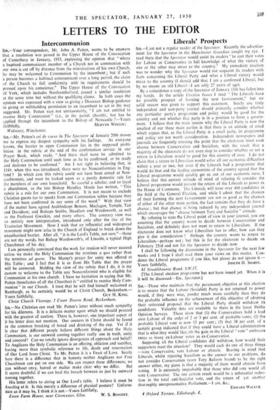SIR,—Mr. Patten's cri de coeur in The Spectator of January
20th moves
me to express my deepest sympathy with his feelings. As everyone knows, the barrier to open- Communion lies in the Supposed prohi- bition in the rubric at the end of the confirmation service in our Prayer Book, which reads, "And there shall none be admitted to the Holy Communion until such time as he be confirmed, or be ready and desirous to be confirmed." Am I not right in believing that, in 1549, when this was introduced, there were no Nonconformists in Eng- land? In which case this rubric could not have been aimed at Non- conformists, and must be looked upon as a purely domestic rule for the members of our own household. So careful a scholar, and so loyal a churchman, as the late Bishop Handley Moule has written, "This rubric is a rule for our own Communion. It is not meant to exclude Christian guests (so to speak) from our Communion tables because they have not been confirmed in our sense of the word." With that view of the matter have agreed Archbishops Benson, Maclagan, Temple, Tait and Davidson; and Bishops Stubbs, Headlam and Wordsworth, as well as the Professor Gwatkin, and many others. The contrary view was an entirely new interpretation, introduced only after the rise of the Tractarian Movement. How I wish that an influential and widespread movement might now arise in the Church of England to break down the unauthorised barrier. After all, "it is the Lord's Table, not ours "—those are not my words, but Bishop Wordsworth's, of Lincoln, a typical High Churchman of his day.
I am personally convinced that the work for reunion will never succeed unless we make the Holy Communion the terminus a quo rather than the terminus ad quem. The Master's prayer for unity was offered at His Table ; and I feel that it is as from His Table that the prayer will be answered. Holding the view of the rubric that I do, it is my custom to welcome to the Table any Nonconformist who is eligible for Communion at his own church. I have no hesitation in saying that Mr. Patten (benefactor of all the Churches) is "entitled to receive Holy Com- munion" in our Church. I trust that he will find himself welcomed at Bamburgh, as he certainly would be at Christ Church, Beckenham.—










































 Previous page
Previous page